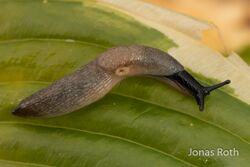Biology:Krynickillus melanocephalus
| Krynickillus melanocephalus | |
|---|---|

| |
| Scientific classification | |
| Domain: | Eukaryota |
| Kingdom: | Animalia |
| Phylum: | Mollusca |
| Class: | Gastropoda |
| Subclass: | Heterobranchia |
| Order: | Stylommatophora |
| Family: | Agriolimacidae |
| Genus: | Krynickillus |
| Species: | K. melanocephalus
|
| Binomial name | |
| Krynickillus melanocephalus | |
Krynickillus melanocephalus is a species of air-breathing land slug, a terrestrial gastropod mollusc in the family Agriolimacidae.[1] It is an invasive species, spreading from regions around the Black Sea to Northern and Central Europe.
Identification
The species resembles in form other agriolimacid slugs (notably Deroceras), so has the pneumostome in the rear half of the mantle and a tapering tail without a marked keel. However, it grows larger than Deroceras species (60 mm or occasionally more). The most distinctive feature is the deep black tentacles, head, and nape, with the dark colouration still visible under the front of the mantle. The congener Krynickillus urbanskii (Wiktor, 1971), occurring in Romania, Bulgaria and Turkey, has a paler black head and a pale nape.[2][3]
Distribution
The natural range of Krynickillus melanocephalus is the Caucasus, Crimea, eastern Turkey and northern Iran.[4][5] It has been introduced more widely within Europe: further parts of Ukraine (e.g. Kyiv),[6] further parts of Russia (Moscow, Novgorod and Tverskaya oblasts),[7] Germany (since 1994),[8] Latvia (since 1997),[9][10] Belarus (since 2009),[11] Sweden (since 2015),[5] Lithuania (since 2017),[12] Finland (since 2017),[5] Hungary (since 2019),[3] Slovakia (since 2020),[13] Poland (since 2022),[14] and Estonia.[5]

Ecology
In its introduced range the species becomes adult in autumn and dies off in winter. It has spread from gardens to adjacent habitats, including woodland and meadows. Although it has sometimes been reported as a pest of crops, others have suggested that a diet of algae, fallen fruit, and fungi makes it less of a threat.[5] In its native range this is a forest species.[2] In experiments, slugs laid far more eggs in leaf litter than in moss, soil or gravel.[15]
References
- ↑ "Krynickillus (Krynickillus) melanocephalus Kaleniczenko, 1851". Fauna Europaea. Fauna Europaea Secretariat, Museum für Naturkunde, Berlin. https://fauna-eu.org/cdm_dataportal/taxon/b129ad48-194c-4caa-8d50-74b8c9a31bca.
- ↑ 2.0 2.1 Wiktor, A. (2000). "Agriolimacidae (Gastropoda: Pulmonata) – a systematic monograph". Annales Zoologici 49 (4): 347–590. https://rcin.org.pl/miiz//Content/57364/PDF/WA058_74192_P255-T49_Annal-Zool-Nr-4.pdf.
- ↑ 3.0 3.1 3.2 Turóci, Á.; Fehér, Z.; Krízsik, V.; Páll-Gergely, B. (7 August 2020). "Two new alien slugs, Krynickillus melanocephalus Kaleniczenko, 1851 and Tandonia kusceri (H. Wagner, 1931), are already widespread in Hungary". Acta Zoologica Academiae Scientiarum Hungaricae 66 (3). doi:10.17109/AZH.66.3.265.2020.
- ↑ Лихарев И. М., Виктор А. Й. (1980). Слизни фауны СССР и сопредельных стран (Gastropoda terrestria nuda). Фауна СССР, Моллюски, том 3, вып. 5, Ленинград
- ↑ 5.0 5.1 5.2 5.3 5.4 von Proschwitz, T. (11 August 2020). "Rapid invasion of the slug Krynickillus melanocephalus Kaleniczenko, 1851 in Sweden and some notes on the biology and anthropochorous spread of the species in Europe (Gastropoda: Eupulmonata: Agriolimacidae)". Folia Malacologica 28 (3): 227–234. doi:10.12657/folmal.028.018.
- ↑ Korol, E.; Korniushin, A.V. (2015). "Introduced population of Krynickillus melanocephalus (Mollusca, Gastropoda, Stylommatophora) recorded in Kyiv and preliminary results of its helminthological investigation". Vestnik Zoologii 36 (6): 57–59. doi:10.13140/RG.2.1.5074.4809.
- ↑ Шиков Е. В. (2013). Адвентивные виды наземной малакофауны городов Московской, Новгородской и Тверской областей. In: Сохранение степных и полупустынных экосистем Евразии: тезисы международной конференции, Алматы, 13-14 марта 2013 г. / Ред. С.Л. Скляренко, Н.П. Огарь, Т.Н. Дуйсебаева - Алматы: АСБК, 143.
- ↑ Meng, S.; Bössneck, U. (1999). "Meng S., Krynickillus melanocephalus Kaleniczenko, 1851 in Deutschland eingeschleppt (Gastropoda: Stylommatophora: Agriolimacidae)". Malakologische Abhandlungen des Staatliches Museum für Tierkunde Dresden 19: 303–309.
- ↑ Stalažs, A.; Šteffek, J.; Dreijers, E. (2008). "Cepaea vindobonensis (C. Pfeiffer, 1828) in Latvia". Acta Universitatis Latviensis. Biology 745: 199–203.
- ↑ Šteffek, Jozef; Stalažs, Arturs; Dreijers, Edgars (29 September 2008). "Snail fauna of the oldest cemeteries from Riga (Latvia)". Malacologica Bohemoslovaca 7: 79–80. doi:10.5817/MaB2008-7-79.
- ↑ Ostrovsky, A.M.. "Новые находки синантропных видов слизней Limacus flavus (Linnaeus 1758) и Krynickillus melanocephalus Kaleniczenko, 1851 (Mollusca, Gastropoda, Stylommatophora) в Беларуси [New records of synanthropic species of slugs Limacus flavus (Linnaeus 1758) and Krynickillus melanocephalus Kaleniczenko, 1851 (Mollusca, Gastropoda, Stylommatophora) in Belarus]". Ruthenica 27 (14): 155–158. doi:10.35885/ruthenica.2017.27(4).2.
- ↑ Stalažs, A.; Dreijers, E.; Ivinskis, P.; Rimšaitė, J.; Džiugelis, M. (2017). "Records of Krynickillus melanocephalus Kaleniczenko, 1851 (Gastropoda: Agriolimacidae) in Lithuania". Bulletin of the Lithuanian Entomological Society 1 (29): 124–128.
- ↑ Čejka, T.; Beran, L.; Coufal, R.; Dvořák, L.; Hlaváč, J.Č.; Horáčková, J.; Horsáková, V.; Juřičková, L. et al. (2021-09-16). "Malacological news from the Czech and Slovak Republics in 2020". Malacologica Bohemoslovaca 20: 56–74. doi:10.5817/MaB2021-20-56.
- ↑ Maćkiewicz, J.J.; Borys, O. (2023). "First record of invasive slug Krynickillus melanocephalus Kaleniczenko, 1851 (Gastropoda: Eupulmonata: Agriolimacidae) in Poland". Folia Malacologica 31 (4): 229–235. doi:10.12657/folmal.031.024.
- ↑ Watz, J.; von Proschwitz, T. (2023). "Egg-laying habitat selection of the invasive slug Krynickillus melanocephalus Kaleniczenko, 1851 (Gastropoda: Eupulmonata: Agriolimacidae)". Folia Malacologica 31 (4): 222–228. doi:10.12657/folmal.031.029.
Wikidata ☰ Q14635695 entry
 |

